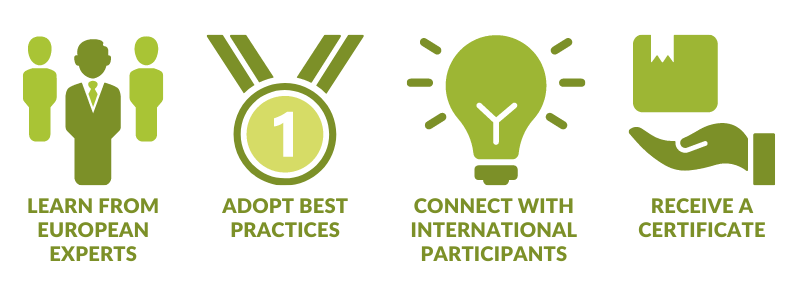Working with high-risk domestic violence perpetrators
Learn to assess and manage the most critical cases

Upcoming Training
Date & time: 19 & 20 December, 9:00-16:30 CET (NEW DATE!)
Language: The training will be held in English
Audience: This training is open to professionals working with perpetrators and/or survivors of domestic violence.
Registration has closed
Learn How To
- Use risk assessment to increase the safety and effectiveness of your programme
- Focus on the safety of your clients' families
- Implement clear organisational protocols for responding to high-risk clients
- Decide whether a client can be accepted into your programme
- Address violent behaviour of perpetrators with complex needs (substance abuse, mental health trauma)
The Course
Working with high-risk perpetrators puts special demands on perpetrator interventions regarding risk management, safety planning, and collaboration with other agencies, especially victim support services and the criminal justice system. We often encounter high-risk perpetrators with multiple issues – substance abuse, mental health including trauma, and other co-occurring factors. Not all men clearly fit our programme exclusion criteria. The training provides insights into many important questions:
- How can you effectively assess and manage high-risk clients?
- How can you address substance abuse, mental health issues and trauma with high-risk men in our groups?
- What do and should high-risk cases mean for the support to victim-survivors?
- What do they mean for multi-agency cooperation?
Training Agenda
Session 1: Risk & harm; risk assessment and its limitations
- Understand the concepts of risk and harm
- Recognise the limits of risk assessment
Session 2: Needs of women and children; cooperation with victim support services
- Understand possible impacts of high-risk clients on their families
- Be able to assess the safety of clients' (ex-)partner and children
Session 3: Internal risk management and key elements of multi-agency work
- Set clear internal procedures for managing high-risk cases
- Understand key elements of multi-agency work and how perpetrators might manipulate other agencies
Session 4: Substance abuse, mental health and trauma
- Understand substance abuse, mental health issues and trauma as co-occurring factors in some high-risk cases
- Be able to assess whether the programme can work with clients who have these issues
- Learn about the key principles in trauma-informed work with perpetrators
Session 5: Addressing substance abuse in perpetrator programmes
- Learn about the links between substance abuse and high-risk IPV
- Learn how to address substance abuse within your programme
Session 6: Practical guidance for working with men with complex needs
- Understand how mental health issues can impact the treatment
- Learn how to decide which men can be suitable for your programme, from the perspective of their mental health
- Develop skills to support mental well-being of clients
The Trainers
Dr Marisol Lila is a full professor of social psychology at the University of Valencia, Spain. She conducts research on public attitudes toward intimate partner violence (IPV) and the judicial system’s response to IPV perpetrators. Since 2006, she is the designer and head of an intervention programme for IPV perpetrators at the University of Valencia (Programa Contexto). She also has designed and evaluated a motivational tool to increase participants’ adherence to IPV perpetrator programmes.
Jonathan Fowler has been working around the impact of violence and abuse in families since 1992. He has worked as a group facilitator and individual therapist with victims and perpetrators of abuse, including nearly ten years in a secure psychiatric clinic and more than ten years in community domestic abuse perpetrator programmes. In addition to front-line work, he has been a teacher and trainer for many years - including teaching counselling and motivational interviewing. He is also a clinical supervisor for staff in the domestic abuse sector, a researcher, and runs an independent research consultancy. His academic background is in Child & Family Studies and currently his research focus is on what works in programmes with domestic abuse perpetrators, with an emphasis on the working alliance, motivational interviewing, and the impact of client impairments in mentalization (lowered ability to think about thoughts and feelings).
Sara Kirkpatrick is the CEO of Welsh Women’s Aid. Formerly she was the Research & Development Manager at Respect, the UK membership organisation for work with domestic violence perpetrators, male victims and young people. In that role, Sara supported member organisations to deliver interventions with perpetrators of domestic violence and abuse, as well as leading on research and service development across the UK. Starting her career providing support in a women’s refuge, she has worked with a range of client groups including male victims, children impacted by domestic abuse, women remaining in abusive relationships and perpetrators of domestic abuse. Sara has contributed to a number of frontline innovative projects with perpetrators of IPV including co-authoring and delivering the award winning CARA conditional caution project, contributing to the development of DRIVE and most recently working alongside Welsh Women’s Aid on their Change That Lasts perpetrator strand.
Sandra Jovanović Belotić, WWP EN Training & Capacity Building Manager, is a psychologist with ten years of experience in the field of domestic violence. She has provided psychological support for women and children exposed to violence, ran the first Serbian perpetrator group and founded the National Network for the Work with Perpetrators of Violence Serbia (OPNA). She has been working as an expert consultant in the field of perpetrator work, focusing on the standardization of perpetrator programmes, and their set-up in accordance with the provisions of the Istanbul convention. Additionally, she is supporting capacity-building of professionals through training and supervision.
